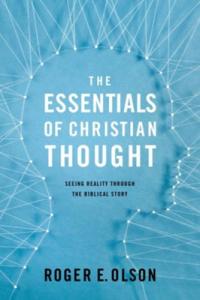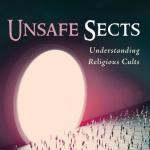A Christian Metaphysic?
Philosopher Alfred North Whitehead said in Religion in the Making that whereas Christianity has always been a religion seeking a metaphysic, Buddhism is a metaphysic generating a religion. In the poorly titled book Essentials of Christian Thought: Seeing Reality through the Biblical Story (Zondervan) I argued that the Bible contains an implicit metaphysic. My suggested title for the book was Biblical Narrative Metaphysics. Strangely enough, the marketers at HarperCollins (which owns Zondervan) nixed that title.
What is a metaphysic? It is a vision of reality beyond or beneath physics—a vision of ultimate reality. Physics becomes a metaphysic when a physicist like Carl Sagan says “The cosmos is all there is, all there ever was, and all there ever will be” Metaphysics comes in many forms. The best known ones are: ultimate dualism, ultimate monism, emanationism (really a form of monism), pantheism (also a form of monism), panentheism, and theism (in various forms). Deism, Christianity, Islam and Judaism are theistic. Hinduism is, in its philosophical form (Vedanta) monistic. Gnosticism is emanationist. Zoroastrianism is dualist. All of these and hybrids appear in popular culture as well as in various religions and philosophies.
A metaphysic is implied in every philosophy, religion and lifestyle. Naturalism is the metaphysic implied in secular humanism as well as atheism. Hedonism implies naturalism. Naturalism is the metaphysical belief that nature, as understood (or potentially understood) by modern science, is all there is.
Is there a basic Christian metaphysic? Please read my book! I wrote it to say there is and express what that metaphysic is. Theologian Emil Brunner called it the “philosophia Christiana.” In the book I interact with theologians E. Charbonnier and Claude Tresmontant (a Protestant and a Catholic) who, together with Jewish theologian A. J. Herschel, believed the Bible contains an implicit metaphysic. I call it “biblical Personalism,” a term I think I borrow from Emil Brunner who might have borrowed it from either Buber or Ebner.
Ultimate reality is personal, relational, love. Catholic theologian Hans Urs von Balthasar also regarded this as the biblical-Christian metaphysic. It is never spelled out philosophically in the Bible; it is simply assumed by the biblical writers.
What philosophers have built on this implicit biblical metaphysic? Hegel, Whitehead, Borden Parker Bowne, Edgar Sheffield Brightman, Kierkegaard, and many, many more. The ancient church fathers assumed it. So did the medieval theologians. So did the reformers. And yet…Whitehead could say that Christianity is a religion seeking a metaphysic?
Okay, what might he have meant? The ancient church fathers faced questions from skeptics and seekers that the Bible itself does not answer. Some drew on Greek philosophies, especially Middle and Neo-Platonism. Some resisted doing that but all seemed to be influenced by Greek philosophy to some extent. That is probably why Whitehead said what he did about Christianity and metaphysics. However, there is assumed by the biblical writers a basic free-standing, independent metaphysic. It may not be comprehensive in terms of answering every possible question such as “What IS evil?” (There Gregory of Nyssa and Augustine rightly drew on Platonism for an answer consistent with the biblical metaphysic: the absence of the good.)
Why are most Christians so ignorant of the biblical metaphysic? (And here I am not insisting that the word “metaphysic” be known or used!) I mean to ask why most Christians seem so ignorant of the biblical “worldview” or Weltanschauung. Over the years I have heard many Christians say things such as, to give just one example, “God is a great cosmic computer.” Somehow many, perhaps most, real Christians (at least in America) know basic Christian doctrines but don’t know that the Bible “teaches” (between the lines, so to speak) a philosophy, a metaphysic, a vision of ultimate reality. So they draw on popular culture or some philosophy they’ve read (or read about) to form their view of ultimate reality. Many are drawing on Buddhism now. Or Vedanta Hinduism. Those who get caught up in Zen Mindfulness or Yoga make themselves vulnerable to those alien-to-the-Bible worldviews.
That there may be some truths in Buddhism and Hinduism is not the issue here. The issue is solely the vision of ultimate reality—personal or impersonal?
I could go on and have—in the poorly titled Essentials of Christian Thought. The book is (hopefully) more than the title. Please don’t judge the book by the title (or the cover).
Over my years of studying and teaching in Christian institutions of higher education I heard much about “faith-learning integration” or “integration of faith and learning,” but I hardly ever heard it explained well. Most explanations of it that I heard were muddled, confusing, destined to cause confusion and consternation among faculty members. So, I wrote “Essentials” to provide the truth of the “faith” part of “integration of faith and learning.” If you are a concerned faculty member of a Christian institution of higher education or have any influence in or over one or are just interested in the subject, please recommend my book to administrators. Most of them require faculty members to integrate Christian faith and learning. Most of them hold required seminars or workshops, etc., about integration of faith and learning (many of which I have attended and some of which I have facilitated). I am confident my book could help, especially with the “faith” part of “integration of faith and learning.”
*Note: If you choose to comment, make sure your comment is relatively brief (no more than 100 words), on topic, addressed to me, civil and respectful (not hostile or argumentative), and devoid of pictures and links.*














